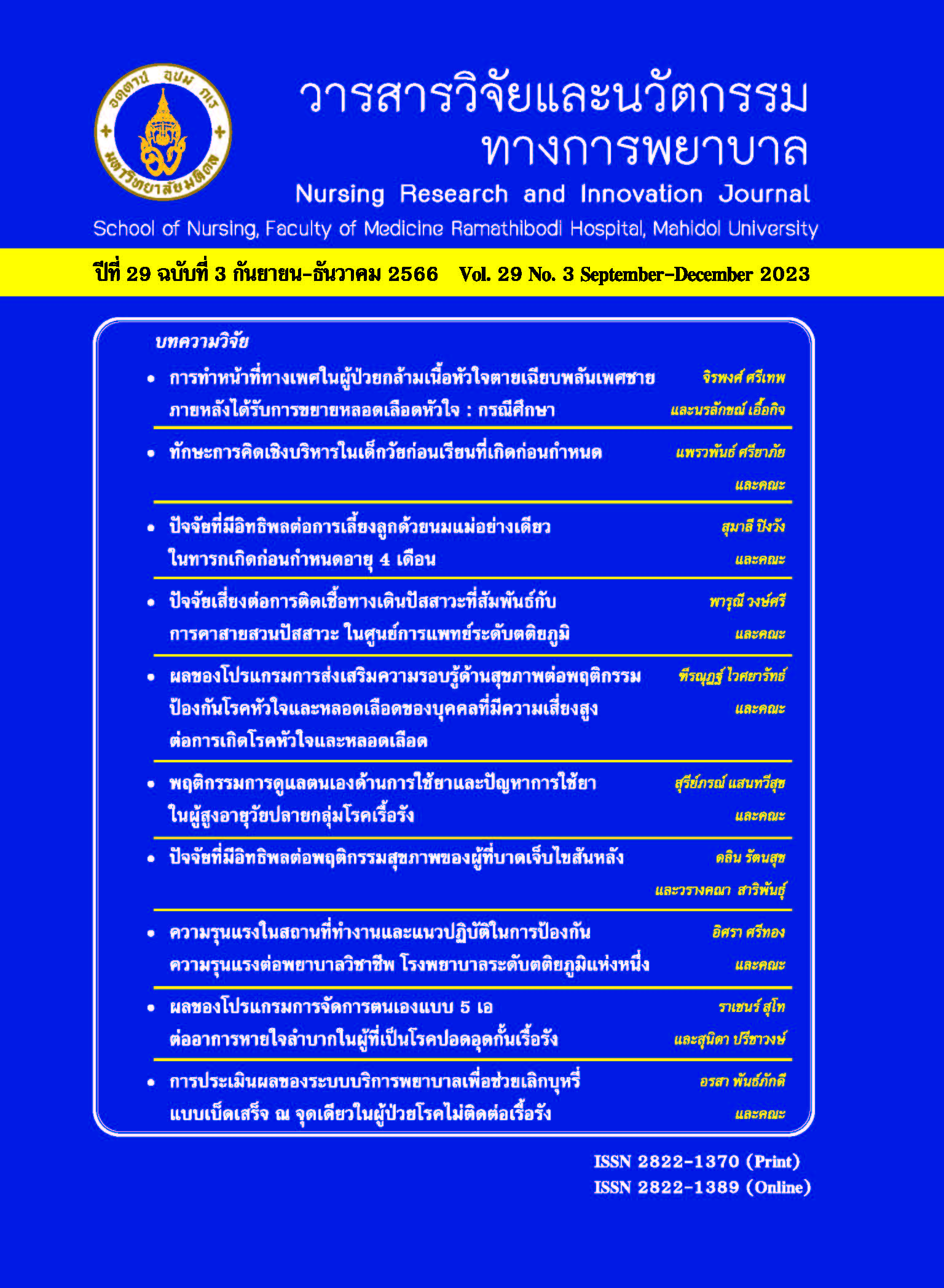Self-Care Behaviors of Medication Use and Medication Use Problems in Old-Old People with Chronic Diseases
Main Article Content
Abstract
This descriptive study aimed to explore self-care behaviors of medication use and medication use problems in old-old people with chronic diseases. Orem’s self-care theory was used to guide the study. The sample consisted of 107 people aged 80 years and over diagnosed by doctors with hypertension and/or diabetes mellitus in Surat Thani Province.Semi-structured interviews were used to collect the data, which were then analyzed using descriptive statistics.The results revealed that nearly half of the sample used services and received medications from subdistrict health promoting hospitals more than other service sources. Most of them (82%) could administer self-medication by recognizing the appearance, color, packaging, name, and medication use methods. They could read, write, or mark the name on the medication case. However, almost all of the sample (90%) did not check the expiry date of medications. Each participant kept medications in different locations or containers associated with their daily life. For medication management, when the doctor stopped prescribing some medications, most participants returned them to the hospital, but some disposed of them. Almost 20% failed to adhere to the doctor’s regimen, including the frequency, dose, and type of medications. Less than half of those who had experienced adverse drug reactions to the medications visited the doctor before the follow-up appointment. The remaining observed their symptoms first; if there were no severe side effects,they would visit the doctor as the previous appointment. This study revealed self-care behaviors of medication use and medication use problems in old-old people with chronic diseases. These results could be used as basic information to develop interventions for promoting appropriate self-care behaviors of medication use and minimizing adverse effects in older people with chronic diseases.
Keywords: Chronic diseases,Medication use,Medication use problems,Old-oldpeople,Self-care behaviors
Article Details

This work is licensed under a Creative Commons Attribution-NonCommercial-NoDerivatives 4.0 International License.
บทความ ข้อมูล เนื้อหา รูปภาพ ฯลฯ ที่ได้รับการตีพิมพ์ในรามาธิบดีพยาบาลสาร ถือเป็นลิขสิทธิ์ของวารสาร หากบุคคลหรือหน่วยงานใดต้องการนำทั้งหมดหรือส่วนหนึ่งส่วนใดไปเผยแพร่หรือเพื่อกระทำการใด ใด จะต้องได้รับอนุญาตเป็นลายลักษณ์อักษรจากรามาธิบดีพยาบาลสารก่อนเท่านั้น
References
Institute for Population and Social Research, Mahidol University and Foundation of Thai Gerontology Research and Development institute (TGRI).Situationof the Thai elderly 2017. Bangkok: Deuan Tula Printing House;2019.
National Statistical Office, Ministry of Digital Economy and Society. Report on the 2017 survey of the older persons in Thailand. Bangkok: Text and Journal Publication; 2018. (in Thai)
McGuire LC,Strine TW, Okoro CA, AhluwaliaIB,Ford ES. Healthy lifestyle behaviors among older U.S. adults with and without disabilities, behavioral risk factor surveillance system, 2003. Prev Chronic Dis. 2007;4(1):A09.
Aekplakorn W. Report on the 5th Thai National Health Examination Survey, NHES V. Nonthaburi: Health Systems Research Institute; 2014. (in Thai)
Porapakkham Y, Plattara-Achachai J. Elderly health problems 2004. JHSR. 2007;1(2):98-115. (in Thai)
Kongkaew C, Noyce PR, Ashcroft DM. Hospital admissions associated with adverse drug reactions: a systematic review of prospective observational studies.Ann Pharmacother. 2008;42(7):1017-25. doi:10.1345/aph.1L037.
Chaichanawirote U, Vithayachockitikhun N. Medication use behaviors among the older Thai adults. J Nurs Health Sci. 2015;9(1):32-46. (in Thai)
Field TS, Gilman BH, Subramanian S, Fuller JC, Bates DW, Gurwitz JH. The costs associated with adverse drug events among older adults in the ambulatory setting. Med Care. 2005;43(12):1171-6. doi: 10.1097/01.mlr.0000185690.10336.70.
Apiratanawong S.Self-medication management in older adults. [Master’s thesis]. Nakhon Pathom: Faculty of Graduate Studies, Mahidol University; 2008. (in Thai)
Ritruangsak S,Siripitayakunkit A,MalathumP.Self-care for medication use in adults with coronary artery disease.Thai J Cardio-Thorac Nurs.2016;27(1):85-97.(inThai)
Orem DE.Nursing:concepts of practice. 6thed.St. Louis,MO: Mosby; 2001.
Naiyapatana W. Health problems, medicine-used problems, and medicine-used behaviors among elderly in the community of Phramongkutklao Hospital Personnel’s Residence. JONAE. 2010;3(1):2-14. (in Thai)
Vatcharavongvan P, Puttawanchai V. Polypharmacy,medication adherence and medication management at home in elderly patients with multiple non-communicable diseases in Thai primary care.Fam MedPrim Care Rev.2017;19(4):412-6. doi: 10.5114/fmpcr.2017.70818.
Muangpaisan W. Adverse drug reactions and prevention in older persons.In:Assantachai P,editor.Common health problems and prevention in older persons.Bangkok:Union Creation; 2013.p. 339-49. (in Thai)
Hanucharurnkul,S.Self-care: science and art innursing.6thed. Bangkok: VJPrinting; 2001. (in Thai)
Brooke P, Bullock R. Validation of a 6 item cognitive impairment test with a view to primary care usage. Int JGeriatr Psychiatry. 1999;14(11):936-40.
Surat Thani Provincial Health Office. Statistics of Surat Thani provincial health 2015-2016.Surat Thani:Surat Thani Provincial Health Office; 2016. (in Thai)
Yamane, T. Statistics: an introductory analysis. 3rd ed.New York: Harper & Row; 1973.
Malathum P. The Six Item Cognitive Impairment Test:6CIT. Unpublished documents. Ramathibodi School of Nursing, Faculty of Medicine Ramathibodi Hospital,Mahidol University; 2017. (in Thai)
Jitapunkul S,Kamolratanakul P, EbrahimS. The meaning of activities of daily living in a Thai elderly population:development of a new index.Age Ageing.1994;23(2):97-101.
Ministry of Public Health. The plan to support the healthcare policy in the fiscal year2021.2021[cited2022 Dec 13].Available from http://203.157.123.2/cco24/15/policy-moph/8_policy.pdf (in Thai)
Yuychim P, Niratharadorn M,Siriumpunkul P, Buaboon N. Effectsof a family participation program in managing drug use behaviors among older adults with chronic disease in Phun Phin community. J Public Health. 2018,48(1):44-56. (in Thai)
Division of Pharmacy,Faculty of Medicine Ramathibodi Hospital, Mahidol University. Expired drugs: dangers that should not be overlooked[Internet]. [cited 2022Dec 13].Available from https://www.rama.mahidol.ac.th/ ramapharmacy/th/knowledge/general/11092015-2303-th (in Thai)
Busapavanich S, Dandacha P. Unsuitable medication use behaviour of chronic kidney disease patients.Songkla Med J. 2006;24(4):281-7. (in Thai)
Pacharachok M.Are leftover medicines safe? 2010 [cited 2022Dec 14].Faculty of Pharmacy,Mahidol University.Available from https://tinyurl.com/y7uwkap4 (in Thai)
Thavornwattanayong W,Geesittisomboon W,Jansuriyakul W, Srinaunrod K, Chanpen S. Survey of leftover drugs and drug use behavior among patients with chronic diseases in Nong Pak Long, Mueang, Nakhon Pathom. J HealthSci.2012;21(6):1140–8. (in Thai)
PinumpholS.Adherence to treatment and clinical outcomes in hypertensive patients attending Nangrong Hospital.JHSR. 2007;1(2):222-8. (in Thai)
Hauber AB, Mohamed AF, Johnson FR, Falvey H.Treatment preferences and medication adherence of people with Type 2 diabetes using oral glucose-lowering agents.Diabet Med. 2009;26(4):416-24. doi: 10.1111/j.1464-5491.2009.02696.x.


